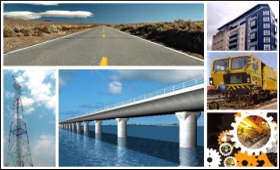|
|
|

|
Indian infrastructure: Time to refocus on the basics
|
|

|
|
| Top Stories |
 |
|
|
|
Taponeel Mukherjee | 12 Feb, 2019
With 2019 underway, it would serve us well to look at some of the most
pressing needs of Indian infrastructure. Trends in global capital
markets and the needs of Indian infrastructure have broadly remained the
same, but so have the challenges.
Recent news that the euro 399
billion Dutch pension fund ABP has lowered the expected investment
returns over the next 10-15 years at five per cent a year on average
from the earlier six per cent (Investment & Pensions Europe) shows
the pressure the global pension fund community is under to deliver
investment returns.
Additionally, a quick look at the Q4 2018
report of another Dutch pension fund, PFZW, shows a reduction in the
current funding ratio from 103.4 per cent to 97.5 per cent. In layman's
terms, the value of current and future outflows from PFZW is higher than
the value of the assets.
The data yet again drives home the
point that in the face of constrained investment returns, the demand for
annuity-type structures is even higher amongst the global capital
providers.
While India has been aware of these trends and has
made a concerted effort towards facilitating the flow of capital, now is
the time to further provide impetus to the idea of "utilising global
capital towards building Indian infrastructure". The agenda for 2019
must be to build on and deal with issues that have slowed infrastructure
creation in India. The core issues that need attention remain the same -
local market funding to facilitate foreign capital inflows, a more
efficient land acquisition strategy, better linkages in policies across
infrastructure segments and, to the extent possible, allowing market
prices to prevail.
India needs to find a better solution towards
providing local market credit to infrastructure projects to facilitate
foreign capital inflows. For a capital provider, it is vital that local
players partake in the risk-taking regarding infrastructure projects.
While
Indian banks have cut back from infrastructure lending, a complete
pullback is not feasible given the size of the balance sheets that banks
wield and given the infrastructure funding requirements. The key for
banks is prudent risk management and effective project selection.
Additionally, other local funding sources such as the National
Investment and Infrastructure Fund (NIIF) and revamped Development
Finance Institution type structures will be crucial.
The
fundamental reason why local funding in infrastructure projects gives
foreign investors greater confidence is that knowing local capital has
"skin in the game" implies more protection for their money.
Land
acquisition remains a significant challenge for infrastructure creation.
Recent issues that specific solar projects faced with getting access to
land further elucidates this fact. The critical step here is to
gradually tie-up land allocation and project allocation through the
sector-specific agencies at work.
Bundling project and land
allocation implies that for instance, when solar tenders are allocated,
the planning on the associated land required is done concurrently with
the tender and not after the tender process. While the issue around land
acquisition is complex, land is the most crucial component of
infrastructure creation in possibly every segment. Therefore, urgent
attention is due.
Co-operation within infrastructure segments,
especially through policies that consider sectoral interlinkages is
crucial for the infrastructure ecosystem to deliver value. Power
generation adds value when transmission and distribution assets can
assist in giving the power to end users. Biofuels can add value when the
water required to generate the raw material for them does not impede
other more critical water needs in an economy.
Continually asking
questions and ensuring that policy consistency is maintained across
interlinked infrastructure sectors is the only way for infrastructure to
indeed create value for all.
While infrastructure assets vary
significantly on the level of regulatory purview, it is essential that
regulations are prudently used and do not stifle risk-taking and value
creation. Asset returns need to be adequate to compensate for the risks
involved to get both global and local capital to fund Indian
infrastructure. Therefore, it is essential that greater focus is paid to
tariff pricing, especially to the drivers of tariff rates. One size
fits all solutions will lead to inefficient outcomes in the long-run.
Now
is the time to further push forward with policies that can help further
facilitate the flow of capital into Indian infrastructure. It is also
essential to realise that such changes are gradual, small iterations in
the right direction can have significant positive lasting effects.
|
|
|
| |
|
|
|
|
|
|
|
|
|
|
|
|
|
|
| |
| Customs Exchange Rates |
| Currency |
Import |
Export |
US Dollar
|
84.35
|
82.60 |
UK Pound
|
106.35
|
102.90 |
Euro
|
92.50
|
89.35 |
| Japanese
Yen |
55.05 |
53.40 |
| As on 12 Oct, 2024 |
|
|
| Daily Poll |
 |
 |
| Do you think Indian businesses will be negatively affected by Trump's America First Policy? |
|
|
|
|
|
| Commented Stories |
 |
|
|
|
|
|
| |
|